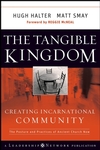 Did you see The 2008 TIME 100 list? Every year, TIME magazine compiles a list of of the 100 most influential people of the past year, divided up into categories like “Leaders and Revolutionaries,” “Scientists and Thinkers,” and “Artists and Entertainers.”
Did you see The 2008 TIME 100 list? Every year, TIME magazine compiles a list of of the 100 most influential people of the past year, divided up into categories like “Leaders and Revolutionaries,” “Scientists and Thinkers,” and “Artists and Entertainers.”
In previous years, I have noticed that at least one pastor made it onto the list. Several years ago Rick Warren was on the list (because of his Purpose Driven Life book). I think that Rob Bell made the list last year. This year, pastor Richard Cizik got half a spot, and an Eastern Orthodox leader, Bartholomew I, also made the list for his stand on environmentalism as a spiritual responsibility. Oh, and of course the Dalai Lama was on the list, as well as the Muslim leader Muqtada al-Sadr. The person I was most excited about was Isaac Berzin, especially when I go fill up my car with gas. Every nation in the world should be sending millions of dollars to Isaac.
I believe that if we, as followers of Jesus, are truly going to be living radical, missional lives of purpose, protecting the planet, healing the abused, giving water to the thirsty, feeding the starving, inventing new and better ways of doing things, and leading the way for global change, then every year we should see more and more Christians on this list. Of course, it is quite likely that many of the people on the list are actually Christians. For example, I think I read somewhere that Craig Ventner is a Christian, and he’s on the verge of “creating” life. Crazy stuff.
I’m not trying to be imperialistic here. I just think that if Christians are trying to live the Kingdom of God, then we should be the most innovative, artistic, and creative activists on earth! We need to be the pacesetters, the trend makers, the world shakers, the vision creators.
Erwin McManus, in his book An Unstoppable Force, put it this way:
The church was never intended to be a monolith but a movement creating moments that change history. …The first century church didn’t keep up with it’s time… The first century church changed time. It rewrote history. It radically impacted culture. The church was the forerunner, not the runner up. And out of the church’s influence came the greatest art, the greatest music, and the greatest thinkers (p. 66).









 A pastor wants to get paid by the people of the church so he can free himself up to do “ministry.” This is not bad, but a missionary will often get a job in the community so he or she can live and work among the people, and be seen as one of them.
A pastor wants to get paid by the people of the church so he can free himself up to do “ministry.” This is not bad, but a missionary will often get a job in the community so he or she can live and work among the people, and be seen as one of them.
